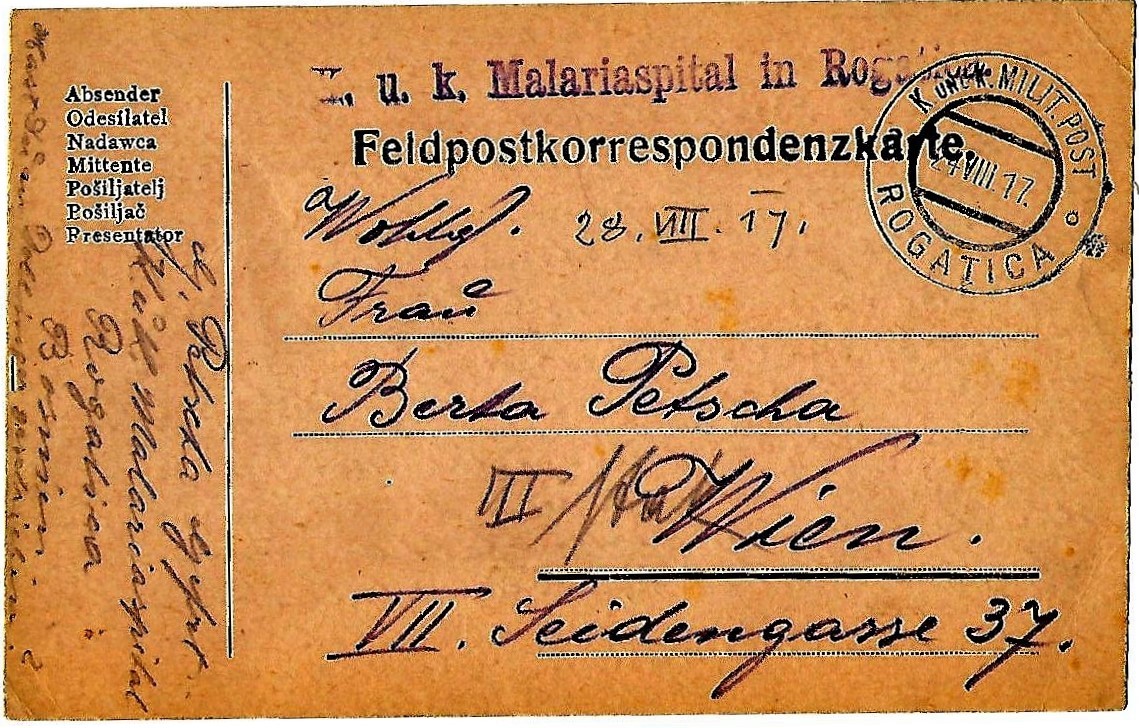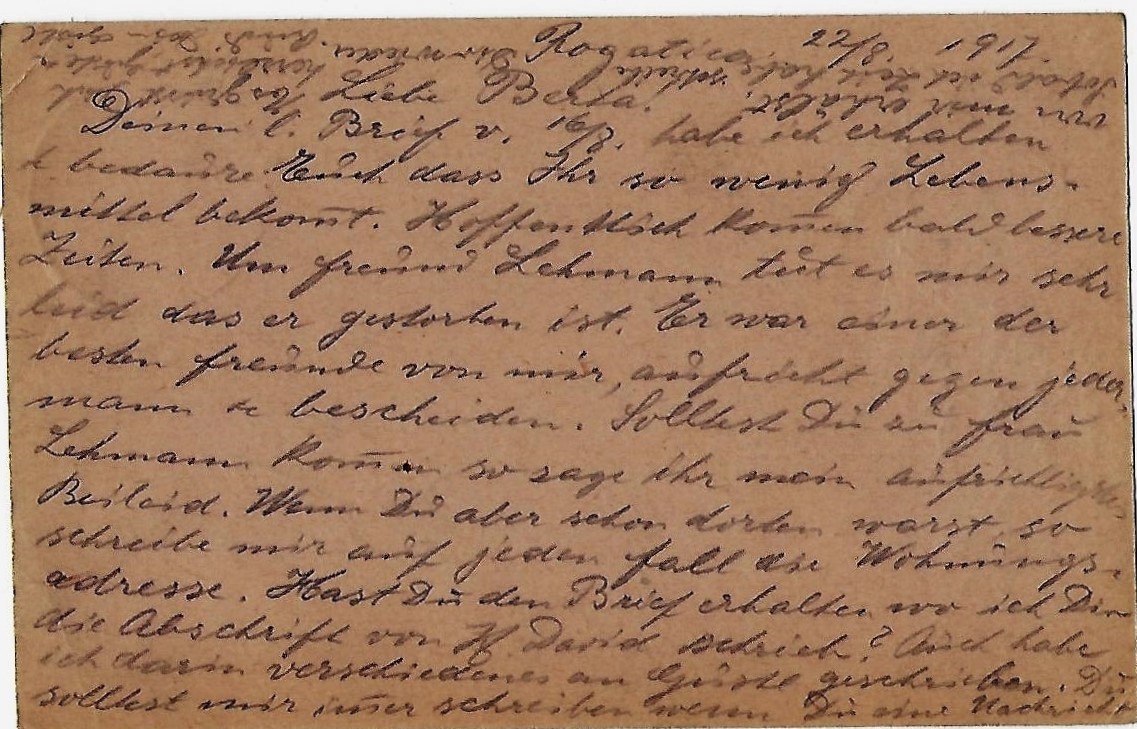Malaria in the Great War - the Rogatica Malariaspital
(Published: May, 2019, Volume 19, Number 2, Issue #49) (Table Of Contents)(Author: Kelly Horn)
As in other military conflicts, malaria caused many casualties in World War I. Pneumonia, small pox, typhoid, and dysentery were all common during the war, but none was as deadly as malaria. Malaria claimed even more lives of those who were admitted into hospitals after being wounded.
The following cover is from a hospital that was dedicated to helping soldiers who had malaria, such as by quarantining the infected soldiers.
Not all of the text on the postcard could be translated, but it was fun to try to decipher as much out of the postal history of the postcard as possible.

Front side: Text in upper left indicates the sender (in German, Czech, Polish, Serbo-Croatian, Serbian, and English). The languages accommodated any number of soldiers who wanted to use the postcard. This postcard was sent by G. Petscha.
Feldpostkorrespondezkarte translates to field service postcard.
During World War I, the term Feldpost in Austria-Hungary referred to: 1) the civil and military organizations responsible for postal communications between the military in the field and the home front and within the Imperial and Royal Army itself, and 2) the actual letters, postcards, and parcels that were conveyed using this service.
Rogatica is a town in what is now Bosnia and Herzegovina.
K.u.K. stands for "Kaiserlich und Königlich," ie, "Imperial and Royal." The authorities responsible for common affairs acted "imperially and royally." All agencies of the Foreign and the War Ministries thus carried the abbreviation "k.u.k.," whereby the first "K" stood for the Kaiser (Emperor) of Austria, the second for the King of Hungary.
The postcard was addressed to Frau Berta Petscha (possibly the writer's sister) in Vienna. Backside text reads:
Backside text reads:
Rogatica, 22.8.1917
Dear Berta, Your kind letter of 18.9 I have received and regret you that you receive too little food. Hopefully better times soon will come. I am very sorry that our friend Lehmann passed away. He was one of my best friends, straight forward with everybody & honest. Should you visit Mrs. Lehmann please let her know my sincere condolences. In case you had been there already please let me know in any case her address. Have you received my letter in which I wrote the transcript of H. David? In that letter I also wrote something for Gustl. You should always write me when you have received a message from me. Kindest Gustl and ??? (not possible to decipher, should be another name). Your Gustl. As soon as I have time I will write (?) you again. (The last bit of text is upside down at the top of the postcard.)
I want to thank the American Philatelic Society's translation service for translating the correspondence.
The following cover is from a hospital that was dedicated to helping soldiers who had malaria, such as by quarantining the infected soldiers.
Not all of the text on the postcard could be translated, but it was fun to try to decipher as much out of the postal history of the postcard as possible.

Front side: Text in upper left indicates the sender (in German, Czech, Polish, Serbo-Croatian, Serbian, and English). The languages accommodated any number of soldiers who wanted to use the postcard. This postcard was sent by G. Petscha.
Feldpostkorrespondezkarte translates to field service postcard.
During World War I, the term Feldpost in Austria-Hungary referred to: 1) the civil and military organizations responsible for postal communications between the military in the field and the home front and within the Imperial and Royal Army itself, and 2) the actual letters, postcards, and parcels that were conveyed using this service.
Rogatica is a town in what is now Bosnia and Herzegovina.
K.u.K. stands for "Kaiserlich und Königlich," ie, "Imperial and Royal." The authorities responsible for common affairs acted "imperially and royally." All agencies of the Foreign and the War Ministries thus carried the abbreviation "k.u.k.," whereby the first "K" stood for the Kaiser (Emperor) of Austria, the second for the King of Hungary.
The postcard was addressed to Frau Berta Petscha (possibly the writer's sister) in Vienna.
 Backside text reads:
Backside text reads:
Rogatica, 22.8.1917
Dear Berta, Your kind letter of 18.9 I have received and regret you that you receive too little food. Hopefully better times soon will come. I am very sorry that our friend Lehmann passed away. He was one of my best friends, straight forward with everybody & honest. Should you visit Mrs. Lehmann please let her know my sincere condolences. In case you had been there already please let me know in any case her address. Have you received my letter in which I wrote the transcript of H. David? In that letter I also wrote something for Gustl. You should always write me when you have received a message from me. Kindest Gustl and ??? (not possible to decipher, should be another name). Your Gustl. As soon as I have time I will write (?) you again. (The last bit of text is upside down at the top of the postcard.)
I want to thank the American Philatelic Society's translation service for translating the correspondence.
References

